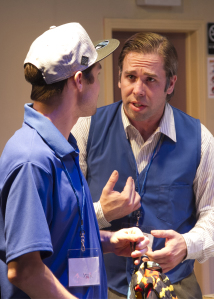Boise Bodies
The Chance Theater’s A Bright New Boise plums the insular world of Anywhere, Idaho
by Joel Beers, OC Weekly

Running through Oct. 25 at South Coast Repertory, Vietgone is a dazzling, inventive, funny, balls-to-the-walls show. Playwright Qui Nguyen’s foul-mouthed, uproarious take on his parent’s flight from war-torn Saigon in 1975 and falling in love at a refugee camp in Arkansas is not a Vietnamese-American play. Rather, it’s a universal play about the dual chaos of war and the human heart, and it is well-worth your time.
But this review isn’t about that. Since Vietgone and the Chance Theater’s A Bright New Boise both close on the same day, a decision must be made. After consulting with our newly appointed responsibility guru, Steve Sarkisian, we opted to review the production at the smaller theater this week. (We’ll tackle SCR’s excellent production next week.) And with Boise, the people at the Chance demonstrate once again that, in this county, there’s SCR, Shakespeare Orange County, the Chance and every other producing entity. All too often, plays in this county feel as if they’re mailed-in. Leaden direction. Poor casting. A sense that since people are dedicating their time (and their social-media feeds to tout how terrific they are), then that’s good enough.
But that isn’t good enough. Lacking a critically aware audience to hold them accountable for rotten shows, basing the success of a show purely on audience size (which makes sense, obviously, but what about artistic merit and creative innovation?), and with very little serious conversation about Orange County theater happening outside of private groups that seem well-intentioned but invariably dissolve into cloying pools of self-congratulation and audition notices, there is a spiraling mediocrity afflicting local theater, both in terms of predictable play selection and execution of those plays.
But not at the Chance. When its plays miss, it’s usually because the material wasn’t that good in the first place, not for lack of professionalism, production value, or the kind of work that’s made up of not only honest effort and dedication (which everyone in local theater possesses), but also genuine thought and vision. Samuel D. Hunter’s bleak, brooding, caustically funny A Bright New Boise is a fitting example. It’s a powerful and intense play on the page that gets a terrific production courtesy of director Trevor Biship, who reconfigures the Chance’s stage into a thrust, with the audience sitting on two sides.
This makes the intense, character-driven play even more intimate, and its fascinating struggle between faith and forgiveness, commerce and art, and the search for meaning in a world that all too often seems meaningless all the more compelling. Will (a powerful, multifaceted Casey Long) is a man on the run from . . . something. He’s arrived in Boise, looking for a job at a once-rundown Hobby Lobby (yes, that chain, but this play, written in 2011, has nothing to do with the Supreme Court case in 2014) that has been turned around by a new manager, Pauline (Karen Jeans Old, a crackling spitfire). But Will has a secret involving a psychologically damaged teenager, Alex (a strong and sympathetic Andrew Guerrero), one that doesn’t sit well with Alex’s older brother, Leroy (David Christian Vera, who comes out so amped-up it makes his eventual softening difficult to embrace). There’s also Anna (the always-captivating Alex Bueno), the biggest misfit in a break room of misfits.
Will’s personal secret, as well as the eruptions that ensue from its revealing, is obviously a big part of the play. But Hunter, who is currently burning up the charts of emerging American playwrights, doesn’t settle for an insular play about messed-up people trying to find their paths. There are Big Issues at work here, mainly dealing with Will’s evangelical, apocalyptic faith. That’s a big bullseye for any playwright to aim his shaft at, but while there are plenty of derisive barbs aimed at Will’s fundamentalist leanings, Hunter is too talented a writer to merely write a play skewering the kind of people the cool kids know are dumb-asses.
In fact, the play’s finest moment is when Will finally explodes, passionately describing the pain felt by those whose greatest sin, perhaps, may be in strongly believing in something in a morally relativistic age when belief in anything—other than the pursuit of money or self-gratification—is dismissed so easily as archaic superstition. That makes the climax, Will’s agonizing choice between clinging to his faith or subsuming it to help in the crisis at hand, so painful to watch.
Whatever he chooses, he’s fucked. Because he’s human. And the most difficult thing for most of us to do is forgive ourselves, and that makes Will, in Long’s sturdy performance, such a sympathetic character. It would be easy to write and portray him as a wild-eyed, paranoid fanatic. But Hunter’s writing and Long’s measured performance, which skillfully builds throughout the show, makes this play feel desperately human.
Leave a Reply

